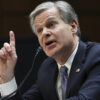Friday is the 14th anniversary of 9/11, the deadliest terrorist attack in history. Four planes were hijacked by al-Qaeda terrorists, who flew a plane into both of New York City’s World Trade Center Towers and the Pentagon. On the fourth plane, the passengers fought back, and the plane crashed in a field in Pennsylvania on its way to Washington, D.C. As a result of these attacks, 2,977 individuals were killed—primarily Americans but also individuals from 92 other countries. September 11 shook the U.S. economy, and while terrorism against U.S. targets was not a new phenomenon, 9/11 violently confronted Americans with the threat of Islamist terrorism.
Fourteen years later, the U.S. has come a long way in terms of its readiness to prevent and combat acts of terrorism. Huge investments in the Department of Homeland Security (DHS), the FBI, the intelligence community, state and local partners, and other government agencies have increased the U.S.’s ability to prevent terrorism before it strikes.
While it is tempting to believe that the threat of terrorism has receded in light of these investments and improvements, the reality is that the threat is as present as ever. Since 9/11, the U.S. homeland has faced 73 Islamist terrorist plots and attacks, according to publicly available information. So far in 2015, the U.S. has foiled at least 11 Islamist terrorist plots against the U.S. homeland, more than any other year since 9/11. This statistic does not even include extremists who seek to travel abroad to fight for ISIS or another terrorist group, which is also a growing area of concern. Heritage has developed a new interactive timeline to clearly illustrate the history of terrorism since 9/11.
In this the so-called long war against terrorism, persistence and vigilance are required to keep Americans safe. On Thursday, Heritage assembled a panel to discuss how well the U.S. is fighting this long war. The panel discussed the four advantages that the U.S. needs in order to fight and win in this war: (1) a strong economy based on economic liberty, (2) strong security at home and abroad, (3) promoting and leading with superior ideas and principles, and (4) protecting the constitutional liberty of U.S. citizens. Sadly, the U.S. is not availing itself of these advantages, as economic growth is stagnant and the world is an increasingly dangerous, unstable place. Panelist Dr. Sebastian Gorka started his remarks by saying that we are losing the long war, and the other panelists essentially agreed.
Indeed, much remains to be done. On the security front, Congress should maintain legitimate surveillance and investigative tools to support a proactive strategy against terrorism that stops terrorists before the public is ever in danger. Redundant expenditures, such as DHS fusion centers, should be streamlined to focus resources where they are most needed. The FBI should continue to improve upon how intelligence drives its efforts, especially in sharing intelligence with state and local partners. DHS should better coordinate government efforts to support state, local, and private-sector partners in countering violent extremism. Finally, the U.S. should take stronger action against terrorist groups worldwide in order to not only eliminate the direct threat they pose to the U.S. and our interests, but also limit their ability to influence and radicalize individuals in the U.S. and around the world.
The threat of terrorism is real and growing. The U.S. must remain committed to fighting the long war that struck home 14 years ago today.























